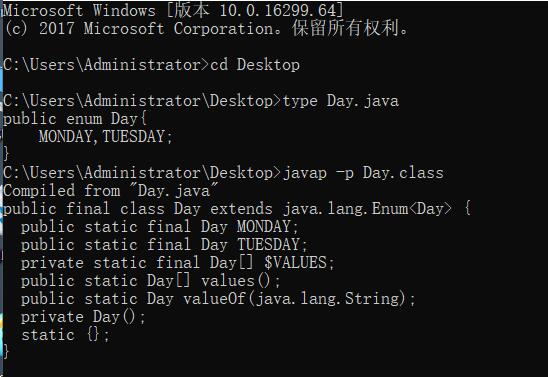【问题】
写代码过程中,定义了一组枚举WEEKDAYS[MONDAY,TUESDAY,......]。此时,如果输入参数为一个WEEKDAYS的参数,我们对这个参数进行值判定的时候,到底用eaquals还是==去判断呢?在JVM中,枚举到底是如何存放的?<Effective Java>中说枚举是单例模式的最佳实现方式,为什么?
【查阅资料】
使用javac将代码进行编译,并用javap命令查看编译之后的字节码文件:

可以看到,枚举类经过编译器的处理,拥有以下特点:
- 构造函数私有;
- 类为final类,继承了java.lang.Enum<E>
- 定义了values()方法返回所有的枚举实例;
- valueOf可以根据枚举的字符串形式转为枚举类实例;
这里,我们可以再看看java.lang.Enum<E>的实现:
public abstract class Enum<E extends Enum<E>> implements Comparable<E>, Serializable { private final String name; public final String name() { return name; } private final int ordinal; public final int ordinal() { return ordinal; } /** * Sole constructor. Programmers cannot invoke this constructor. * It is for use by code emitted by the compiler in response to * enum type declarations. * * @param name - The name of this enum constant, which is the identifier * used to declare it. * @param ordinal - The ordinal of this enumeration constant (its position * in the enum declaration, where the initial constant is assigned * an ordinal of zero). */ protected Enum(String name, int ordinal) { this.name = name; this.ordinal = ordinal; } public String toString() { return name; } public final boolean equals(Object other) { return this==other; } public final int hashCode() { return super.hashCode(); } /** * Throws CloneNotSupportedException. This guarantees that enums * are never cloned, which is necessary to preserve their "singleton" * status. * * @return (never returns) */ protected final Object clone() throws CloneNotSupportedException { throw new CloneNotSupportedException(); } public final int compareTo(E o) { Enum<?> other = (Enum<?>)o; Enum<E> self = this; if (self.getClass() != other.getClass() && // optimization self.getDeclaringClass() != other.getDeclaringClass()) throw new ClassCastException(); return self.ordinal - other.ordinal; } /** * Returns the Class object corresponding to this enum constant's * enum type. Two enum constants e1 and e2 are of the * same enum type if and only if * e1.getDeclaringClass() == e2.getDeclaringClass(). * (The value returned by this method may differ from the one returned * by the {@link Object#getClass} method for enum constants with * constant-specific class bodies.) * * @return the Class object corresponding to this enum constant's * enum type */ @SuppressWarnings("unchecked") public final Class<E> getDeclaringClass() { Class<?> clazz = getClass(); Class<?> zuper = clazz.getSuperclass(); return (zuper == Enum.class) ? (Class<E>)clazz : (Class<E>)zuper; } public static <T extends Enum<T>> T valueOf(Class<T> enumType, String name) { T result = enumType.enumConstantDirectory().get(name); if (result != null) return result; if (name == null) throw new NullPointerException("Name is null"); throw new IllegalArgumentException( "No enum constant " + enumType.getCanonicalName() + "." + name); } /** * enum classes cannot have finalize methods. */ protected final void finalize() { } /** * prevent default deserialization */ private void readObject(ObjectInputStream in) throws IOException, ClassNotFoundException { throw new InvalidObjectException("can't deserialize enum"); } private void readObjectNoData() throws ObjectStreamException { throw new InvalidObjectException("can't deserialize enum"); } }
对于枚举类型来说,equals与==是一样的。而name()和toString()也是一样的,都是返回枚举内部的name字段。为了保护这种单例形态,枚举不能进行clone()。所以,在使用枚举时,拿到枚举实例再进行A.toString().equals(B.toString())的比较是完全没有必要的,直接A==B来判断就好,因为枚举的定义就是static final的,只有一份且值也无法被修改。
【参考】
https://www.cnblogs.com/alter888/p/9163612.html